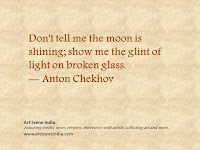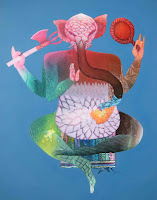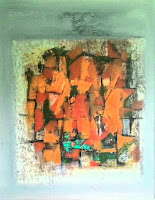A well-written catalogue text adds value to your art and provides a reference point for viewers.

Over the years, I must have received hundreds of press/ media kits from artists having exhibitions. The art catalog on a CD or a hard copy by post has been an inevitable part of the kit and these are sent by the artist or gallery.
It does not matter if the show is in a well-known private gallery, a hotel, or in a public gallery self-hosted by the artist. However, there has been a steady decline in the number of catalogues that accompanies a press kit. Not surprising, given the cost of publishing and printing, current economic conditions and the state of the art market.
Of late, very few galleries will wholly sponsor an art exhibition, let alone pay for a 20 page glossy catalogue. This is how conditions are and it is a matter of survival for many galleries in India. In the West too, the trend of catalogues accompanying an exhibition is on the decline, but remember writing fees are also much higher there. Here, you will find most curated shows have detailed catalogues. Also, museums come out with catalgues that become highly collectible.
In my opinion it is important to have text for a show, whether it is a solo or a group exhibition. You may print the catalogue for the show or do an e-copy now and print it at a later date when you have the resources. The important thing is to get a catalogue done, at the least a soft copy, which broadly means the text – a critical essay by a critic/writer/scholar, an artist statement, images from the show with all relevant details and the artist’s biography. Also, part of the text can be printed on the invite, or you can print handouts for viewers.
Why?
1. A catalogue is an important tool for communication
It is a widely known fact that communication is easier through words. Yes, a picture might be worth a thousand words, and you may have produced an excellent series of visual work, but the right text will add perspective to your art and help in communicating better to viewers, buyers, gallerists and the media. It is also highly relevant when you have the catalogue text written for your art now for future shows, particularly exhibitions planned abroad.
2. A well-written catalogue text adds value to your art

Apart from the communication factor, insights provided by the critic, especially if it is somebody well-known and respected from the art field adds value to the exhibition. In a way, just as the venue/gallery where you are exhibiting is important, so are the credentials of the person writing about your exhibition.
3. The text provides a context
Words help in setting your art within a larger framework. The text should offer a critical analysis of your work, its contemporary context and relevance from an art historical perspective and insights into your work. It tells the viewer what to expect and essentially provides a reference point for your art. There are several artists who believe that they would like to refrain from giving textual clues to the viewer, nevertheless, viewers appreciate reading about your art and understanding where you are coming from.
4. The catalogue is part of the documentation process
Presumably, you are documenting your work as an artist that means cataloging images and all other details digitally with regular backups. A catalogue is an important part of this process, which you can use and refer to whenever required. The catalogue also comes in useful when you approach new galleries, collectors and curators.
5. Internet reach
The Internet allows you to reach out to a much larger audience base, which you may not have been able to approach earlier. In fact, you must plan in such a way that your catalogue text becomes more accessible virtually – you can put it up on your website and share excerpts on social media, emails and newsletters. All this enhances your reach considerably and allows you to tap into newer markets.
Commonly asked questions
Who do I approach to write my catalogue text or essay?
Ideally, a well-known critic is the best option, however, if that is not feasible, look for writers who are well established in the art world and who are familiar with your work. For instance, I like to write for artists whose works I can relate to. That way, I can be fair to the artist and do justice to his/her work. Incidentally, you can also have more than one person writing an essay; just make sure that they address different aspects of your art to avoid repetition. Once you have the text you can decide how best to maximise it.
Can I write the text myself?
That would be the artist statement. It cannot be a critical essay on your art. Ideally, you should have both, at least one essay and an artist statement as part of your catalogue, along with all the other elements I had mentioned earlier.
What about costs?
It depends on who you approach for the text. It might be possible for you to get a short essay done for a
couple of thousand rupees by a relatively new writer. But, I would suggest you invest more and have the text written by someone with more experience and better credentials. Remember, how I talked about adding value to your art, that’s one of the reasons you need to approach an appropriate writer who can take your art to another level. Believe me, there are writers who can add so much value to your art.
Be prepared to spend Rs 10,000 to 25,000 or more for a 500-1000 word text. Then, there are additional costs in design, layout, compilation, proofreading and printing, if you choose to do so. If you print, the cost will also depend on the number of pages, size and copies. But, you can choose to print later and do an e-version now along with an abbreviated copy as handouts. Many artists I know design their own catalogue, which saves them a substantial amount of money.
This is too expensive!
I agree and therefore you may want to look for a sponsor. There are corporates and foundations that will sponsor the catalogue partly or wholly. You can also approach your old collectors and see if they would like to bear costs in exchange of an artwork. Your gallery may also be able to point you towards the right people willing to share costs in exchange for credits and adverts.
You can also opt for fewer words to optimise writer's fees.
Hope this article helps you in deciding about a catalogue for your current art series or your next exhibition. Let me know if you have any more questions or would like me to write your catalogue essay; send me an email at artsceneinfo@gmail.com
No part of this article can be reproduced in part or whole on a blog/website or in print without permission.
If
you enjoyed reading this article, do share it using the social
media widgets at the top and subscribe to receive regular updates
from Art Scene India
Related posts,

























